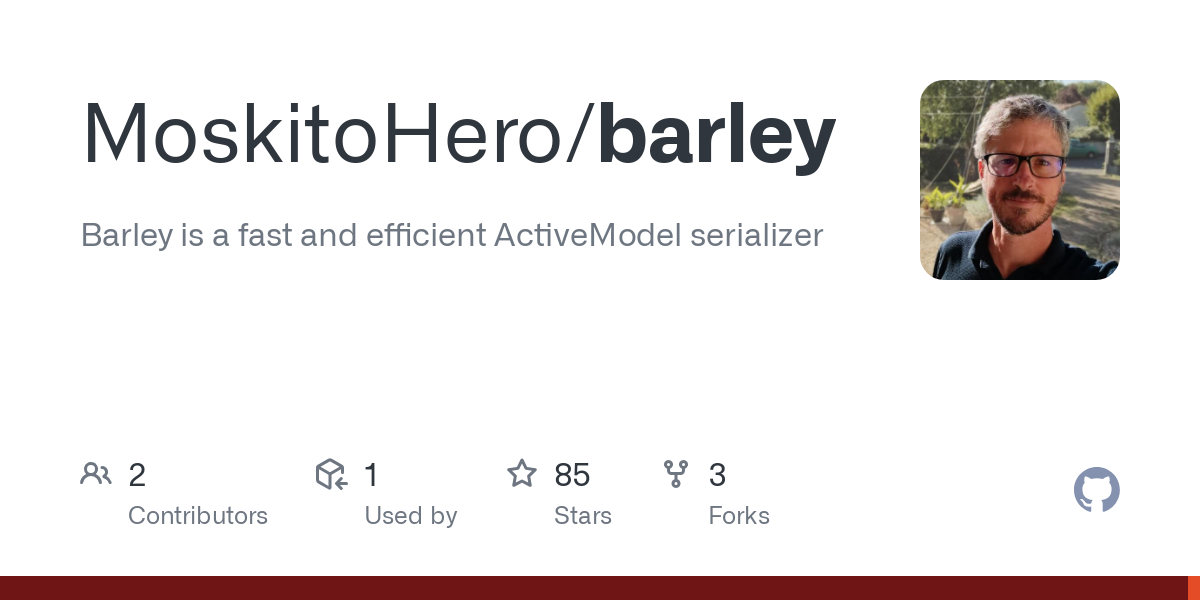An introduction to Barley, the fast model serializer
I have published a simple ActiveModel serializer called Barley. It is very, very fast, easy to use, and it comes with caching and type-checking baked in. Here is a little introduction.

The story
The company I used to work for had an ageing API in v1 that was very poorly designed and slow in its implementation. It served 4 frontend platforms (a website, two mobile apps and an administration tool). Being in a startup environment, our team had to move fast, but that was at the expense of performance and maintainability. This was the situation when I arrived there.
Returning JSON objects was very cumbersome. It used a custom method, available in each model that built a nested Hash, based on the attributes you gave it. That turned out to be a mess with poor performance and concerning security implications. It was difficult to maintain, with odd variable naming and behavior, so we set out to get rid of it somehow and moved to a kind of serializer DSL that was gradually introduced to replace the old mess.
Later, we decided to tighten up our API with a new version to get rid of the legacy. A few requirements quickly emerged, among which:
- API V2 should be easy to maintain, with clear naming conventions and namespacing
- Since it is an internal API, it should be tightly coupled to the intended use and platform
- API V2 should use some sort of view DSL to generate the JSON payloads
- API V2 should be as predictable as possible in terms of typing and formatting.
- API V2 should be super fast by default. It should be the last thing we need to optimize.
So I looked at the serializer DSL that we had designed for API v1.
The first thing I did was to benchmark it against other solutions. So I stripped it out of legacy / no longer needed features, moved it to a local gem, and started playing with a few benchmarks.
And it was very fast indeed ! This is the result of a benchmark I did back then:
Warming up --------------------------------------
# Omitted for conciseness
Calculating -------------------------------------
ams 67.770 (± 1.9%) i/s - 657.000 in 10.042270s
jsonapi-rb 157.239 (± 2.3%) i/s - 1.521k in 10.010257s
barley 96.909 (± 2.4%) i/s - 945.000 in 10.036316s
barley-cache 4.589k (± 2.8%) i/s - 44.620k in 10.010004s
ams eager 68.237 (± 6.2%) i/s - 592.000 in 10.087602s
jsonapi-rb eager 289.733 (± 3.7%) i/s - 2.805k in 10.033912s
barley eager 406.732 (± 3.2%) i/s - 3.922k in 10.020076s
barley-cache eager 639.935 (± 2.4%) i/s - 6.300k in 10.053710s
with 95.0% confidence
Comparison:
barley-cache : 4589.3 i/s
barley-cache eager: 639.9 i/s - 7.17x (± 0.27) slower
barley eager: 406.7 i/s - 11.29x (± 0.49) slower
jsonapi-rb eager: 289.7 i/s - 15.83x (± 0.74) slower
jsonapi-rb : 157.2 i/s - 29.17x (± 1.08) slower
barley : 96.9 i/s - 47.37x (± 1.75) slower
ams eager: 68.2 i/s - 67.25x (± 4.69) slower
ams : 67.8 i/s - 67.72x (± 2.31) slower
with 95.0% confidence
Calculating -------------------------------------
# Omitted for conciseness
Comparison:
barley-cache : 46090 allocated
barley-cache eager: 216790 allocated - 4.70x more
barley eager: 354326 allocated - 7.69x more
jsonapi-rb eager: 694430 allocated - 15.07x more
jsonapi-rb : 926082 allocated - 20.09x more
ams eager: 1068038 allocated - 23.17x more
barley : 1102354 allocated - 23.92x more
ams : 1299674 allocated - 28.20x moreWhich is quite nice 😎.
Sharing is caring
So I made a gem out of our serializer and published it on Github. It is named Barley.
I have recently made the gem even faster (from v0.9.0 on) and benchmarked it against Alba, Blueprinter, Turbostreamer, Jserializer, FastSerializer, Representable, SimpleAMS, AMS, Rails JBuilder and Panko.
Here are the results of these new benchmarks:
ruby 3.4.3 (2025-04-14 revision d0b7e5b6a0) +YJIT +PRISM [x86_64-linux]
Warming up --------------------------------------
# Omitted for conciseness
Calculating -------------------------------------
alba 401.119 (± 1.7%) i/s (2.49 ms/i) - 2.016k in 5.027350s
alba_with_transformation
256.123 (± 1.2%) i/s (3.90 ms/i) - 1.300k in 5.076497s
alba_inline 22.749 (± 8.8%) i/s (43.96 ms/i) - 114.000 in 5.049973s
ams 16.923 (± 5.9%) i/s (59.09 ms/i) - 85.000 in 5.029061s
barley 427.045 (± 2.6%) i/s (2.34 ms/i) - 2.162k in 5.066130s
barley_cache 378.285 (± 2.4%) i/s (2.64 ms/i) - 1.927k in 5.097462s
blueprinter 120.704 (± 1.7%) i/s (8.28 ms/i) - 612.000 in 5.071371s
fast_serializer 142.347 (± 1.4%) i/s (7.03 ms/i) - 720.000 in 5.058924s
jserializer 252.455 (± 1.6%) i/s (3.96 ms/i) - 1.274k in 5.047584s
panko 510.262 (± 4.7%) i/s (1.96 ms/i) - 2.585k in 5.077381s
rails 107.589 (± 7.4%) i/s (9.29 ms/i) - 546.000 in 5.104715s
representable 50.264 (± 6.0%) i/s (19.89 ms/i) - 252.000 in 5.027987s
simple_ams 36.584 (± 5.5%) i/s (27.33 ms/i) - 184.000 in 5.054347s
turbostreamer 351.551 (± 1.7%) i/s (2.84 ms/i) - 1.776k in 5.053401s
Comparison:
panko: 510.3 i/s
barley: 427.0 i/s - 1.19x slower
alba: 401.1 i/s - 1.27x slower
barley_cache: 378.3 i/s - 1.35x slower
turbostreamer: 351.6 i/s - 1.45x slower
alba_with_transformation: 256.1 i/s - 1.99x slower
jserializer: 252.5 i/s - 2.02x slower
fast_serializer: 142.3 i/s - 3.58x slower
blueprinter: 120.7 i/s - 4.23x slower
rails: 107.6 i/s - 4.74x slower
representable: 50.3 i/s - 10.15x slower
simple_ams: 36.6 i/s - 13.95x slower
alba_inline: 22.7 i/s - 22.43x slower
ams: 16.9 i/s - 30.15x slower
Calculating -------------------------------------
# Omitted for conciseness
Comparison:
panko: 259178 allocated
barley: 633521 allocated - 2.44x more
turbostreamer: 641760 allocated - 2.48x more
alba_with_transformation: 818181 allocated - 3.16x more
alba: 818241 allocated - 3.16x more
jserializer: 822281 allocated - 3.17x more
barley_cache: 849521 allocated - 3.28x more
fast_serializer: 1470121 allocated - 5.67x more
blueprinter: 2297921 allocated - 8.87x more
alba_inline: 2736041 allocated - 10.56x more
rails: 2757857 allocated - 10.64x more
ams: 4713401 allocated - 18.19x more
representable: 5151321 allocated - 19.88x more
simple_ams: 9017033 allocated - 34.79x moreWith YJIT enabled, Barley really shines and is the first Hash serializer of the group.
There are more benchmarks to be found in the Barley repository.
Barley is very simple in its implementation and allocates very little. I believe that it is what makes it so fast. I’ll write another post on how I optimized it in version 0.9.0.
The Features
Barley provides:
- a clear DSL to define your serializer
- inline / block sub-serializer definition
- russian-doll caching
- type-checking with dry-types
- context handling
This is how Barley works:
In the model you want to serialize
First, include the Barley::Serializable concern in your model.
# /app/models/user.rb
class User < ApplicationRecord
include Barley::Serializable
end
Once you include this module, Barley will look for a UserSerializable class in your codebase, so you need to define one, typically in the app/serializable directory. It should inherit from Barley::Serializer
# /app/serializers/user_serializer.rb
class UserSerializer < Barley::Serializer
end
Once this is set up, the as_json method on your model will return what you have defined in your serializer class.
You can also chose to use a different serializer to render your data. You can use the serializer method in your model. This method also allows you to pass a cache argument.
# /app/models/user.rb
class User < ApplicationRecord
include Barley::Serializable
serializer MyCustomSerializer, cache: true
# or
serializer MyCustomSerializer, cache: {expires_in: 1.hour}
end
Another way to achieve this is through the as_json method:
User.first.as_json(serializer: MyCustomSerializer, cache: {expires_in: 1.hour})
Please note that Barley overrides the as_json method and does not provide it with standard only, include or except arguments. This is because the purpose of this serializer is precisely to do that job. The root argument works, though.
Defining the serializer
Let's go back to the serializer class. Barley provides a simple DSL that allows you to define your JSON in a readable and maintainable way. Here is an example definition that covers most use cases:
# /app/serializers/user_serializer.rb
class UserSerializer < Barley::Serializer
attributes id: Types::Strict::Integer, :name
attribute :email
attribute :value, type: Types::Coercible::Integer
many :posts
one :group, serializer: CustomGroupSerializer
many :related_users, key: :friends, cache: true
one :profile, cache: { expires_in: 1.day } do
attributes :avatar, :social_url
attribute :badges do
object.badges.map(&:display_name)
end
end
end
For type-checking to work, you need to define a Types module like this, somewhere in your codebase:
module Types
include Dry.Types()
end
1. Attributes
They can be defined as an array with the plural attributes method. It can be an array of symbols, or an array of hashes in the key: TypeDefinition pattern, or a mix of both.
They can also be defined with a singular attribute method, that accepts a type keyword argument.
If type is included in an attribute's definition, it will raise an error. You can use types to coerce types and define constraints. Please refer to the dry-types gem for more options.
If you give a block to the attribute method, you can also return anything you like. You have the object object at hand that refers to the serialized model.
2. Associations
They are defined with the one or many methods.
It will use the default serializer if no argument is given. You can provide it with a serializer and a cache option.
These methods do not provide a type argument, as it makes no sense to do so.
You can also decide to give it a block, that allows you to define the association's serializer inline.
Wrapping it up
The Barley gem's goal is to provide a simple DSL to define your JSON payloads with a type-proof option, and render it in a very fast and efficient manner. It is probably not as feature-packed as other serializers available to the rails community, but it is a no-brainer, yet powerful option that you should consider if you are looking for performance and simplicity.
I'd be happy to see more projects starting to adopt it and would love the community to provide optimizations to make it even better.


